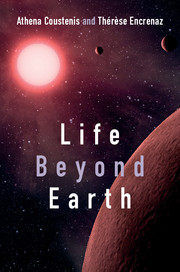Book contents
- Frontmatter
- Contents
- Preface
- 1 Introduction
- 2 What is life and where can it exist?
- 3 Terrestrial planets and their diverging evolutions
- 4 Searching for habitable sites in the outer Solar System
- 5 A revolution in astronomy: the exploration of extrasolar planets
- 6 Extraterrestrial habitable sites in the future
- Further reading
- Index
- Plate Section
1 - Introduction
Published online by Cambridge University Press: 05 October 2013
- Frontmatter
- Contents
- Preface
- 1 Introduction
- 2 What is life and where can it exist?
- 3 Terrestrial planets and their diverging evolutions
- 4 Searching for habitable sites in the outer Solar System
- 5 A revolution in astronomy: the exploration of extrasolar planets
- 6 Extraterrestrial habitable sites in the future
- Further reading
- Index
- Plate Section
Summary
The search for life in the Universe, from theoretical concept to actual exploration, has never ceased to interest and amaze humanity. After the first ideas had arisen on cosmology (the structure of the cosmos) and cosmogony (its creation), early civilizations and philosophers turned their minds towards living beings and how they came to be. Once some basic principles had been set – for instance in the biblical book of Genesis or in Hesiodos’ Theogony, which both basically define the creation of Earth and Heavens from nothing (or Chaos) – the first ‘scientific’ minds set to work all over the world, and new ideas were sparked in Egypt, in the Indies, in the Americas, in China and in Europe. Thus, in Greece for instance, Aristarchus conceived the idea of the heliocentric Solar System; Eratosthenes proved that the Earth was spherical and determined the distance to the Moon; and Anaximander had a structure worked out for the whole Universe.
Some of the early thinkers had already advocated a Universe consisting of ‘many worlds’. Thales, from Miletus, and his students in the seventh century BCE argued for a Universe full of other planets, teeming with extraterrestrial life. They also proposed the idea with which we are all familiar today (through Drake’s equation, Carl Sagan’s musings, and the contributions of many other scientists): that a Universe so full of stars must also have a large number of populated worlds. This proposal was defended by Epicurus and other Greek atomists who countered the geocentric models put forward later by Aristotle. In the cosmogony developed by Plato’s famous disciple, the mythological separation of Earth from the Heavens was put into more modern words and widely promoted, as was his geocentric perception of the cosmos and the limited and well-defined sphere of stars in which matter and space were confined and interconnected. Aristotle’s philosophical attempt at modern physics took strong roots, caused the ancient open-minded theories to be forgotten and hindered scientific progress in this domain for quite a long period. The Copernican revolution in the sixteenth century gave a boost to the concept of life’s emergence and possible existence elsewhere in the Universe, because Earth was no longer the privileged and unique place where this could occur.
Information
- Type
- Chapter
- Information
- Life beyond EarthThe Search for Habitable Worlds in the Universe, pp. 1 - 18Publisher: Cambridge University PressPrint publication year: 2013
